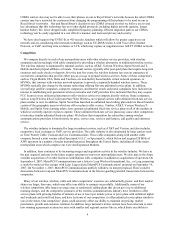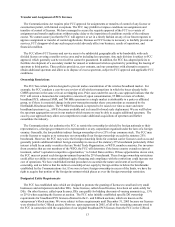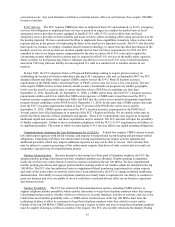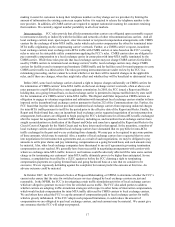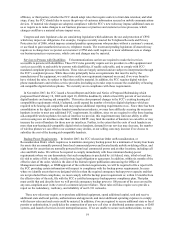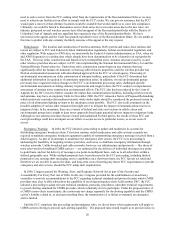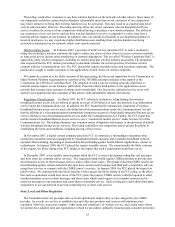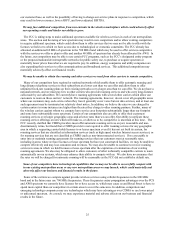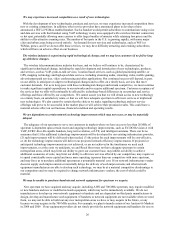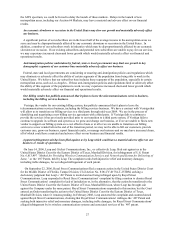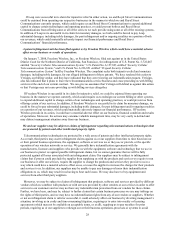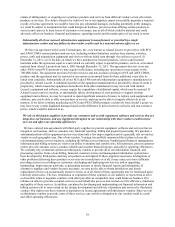Metro PCS 2007 Annual Report Download - page 30
Download and view the complete annual report
Please find page 30 of the 2007 Metro PCS annual report below. You can navigate through the pages in the report by either clicking on the pages listed below, or by using the keyword search tool below to find specific information within the annual report.
19
affiliates, or third parties; whether the FCC should adopt rules that require carriers to limit data retention; and what
steps, if any, the FCC should take to secure the privacy of customer information secured on mobile communications
devices. If material rule changes are adopted, compliance with the FCC’ s new rules may impose additional costs on
us or require us to make changes to our business processes or practices and customer service processes, which
changes could have a material adverse impact on us.
Congress and state legislators also are considering legislation which addresses the use and protection of CPNI
which may impact our obligations. For example, Congress recently enacted the Telephone Records and Privacy
Protection Act of 2006, which imposes criminal penalties upon persons who purchase without a customer’ s consent,
or use fraud to gain unauthorized access to, telephone records. The recent and pending legislation (if enacted) may
require us to change how we protect our customer’ s CPNI and could require us to incur additional costs or change
our business practices or processes, which costs and changes may be material.
Services to Persons with Disabilities. Telecommunications carriers are required to make their services
accessible to persons with disabilities. These FCC rules generally require service providers to offer equipment and
services accessible to and usable by persons with disabilities, if readily achievable, and to comply with FCC-
mandated complaint/grievance procedures. These rules are largely untested and are subject to interpretation through
the FCC’ s complaint process. While these rules principally focus on requirements that must be met by the
manufacturer of the equipment, we could have costly new requirements imposed on us and, if we were found to
have violated the rules, be subject to fines that could be material. In addition, the FCC requires digital wireless
phone manufacturers and wireless service providers (including us) to take steps to ensure the availability of hearing
aid compatible digital wireless phones. We currently are in compliance with these requirements.
In November 2007, the FCC issued a Second Report and Order and Notice of Proposed Rulemaking which
postponed from February 18, 2008 until April 18, 2008 the deadline by which at least fifty percent of our wireless
digital handsets are hearing aid compatible. This notice also proposed changes to the FCC’ s existing hearing aid
compatibility requirements which, if adopted, could expand the number of wireless digital telephones which are
required to be hearing aid compatible and may impose additional reporting requirements on us. Since there has been
consolidation in the digital wireless handset manufacturers industry, we may have difficulty securing the necessary
handsets in order to meet any additional FCC requirements. In addition, since we are required to offer these hearing
aid-compatible wireless phones for each air interface we provide, this requirement may limit our ability to offer
services using new air interfaces other than CDMA 1XRTT, may limit the number of handsets we can offer, or may
increase the costs of handsets for those new air interfaces. Further, to the extent that the costs of such handsets are
more than non-hearing aid-compatible digital wireless handsets, demand for our services may decrease, the number
of wireless phones we can offer to our customers may decline, or our selling costs may increase if we choose to
subsidize the cost of the hearing aid-compatible handsets.
Backup Power Requirements. In October 2007, the FCC released an Order on Reconsideration, or
Reconsideration Order, which requires us to maintain emergency backup power for a minimum of twenty-four hours
for assets that are normally powered from local commercial power and located inside mobile switching offices, and
eight hours for assets that are normally powered from local commercial power and at other locations, including cell
sites and DAS nodes. We will not be required to comply immediately with these minimum backup power
requirements where we can demonstrate that such compliance is precluded by: (i) federal, state, tribal or local law;
(ii) risk to safety of life or health; or (iii) private legal obligation or agreement. In addition, within six months of the
effective date of the order, which is the date of the federal register publication announcing the Office of
Management and Budget, or OMB approval of the collection requirements, we will be required to file a report with
the FCC providing certain information with respect to compliance with the backup power requirements. In cases
where we identify assets that were designed with less than the required emergency backup power capacity and that
are not precluded from compliance, we must comply with the backup power requirement or, within 12 months from
the effective date of the rule, file with the FCC a certified emergency backup power compliance plan. That plan
must certify that and describe how we will provide emergency backup power to 100 percent of the area covered by
any non-compliant asset in the event of a commercial power failure. These rules will also require us to provide a
report on the redundancy, resiliency, and reliability of our E-911 networks.
These new rules may require us to purchase additional equipment, spend additional capital, seek and receive
additional state and local permits, authorizations and approvals, and incur additional operating expenses to comply
with the new rules and such costs could be material. In addition, if we are required to secure additional state or local
permits or authorization, it could delay the construction of any new cell sites or distributed antenna systems, or DAS
systems, and launch of services in new metropolitan areas. If we are unable to secure such authorizations, we may


